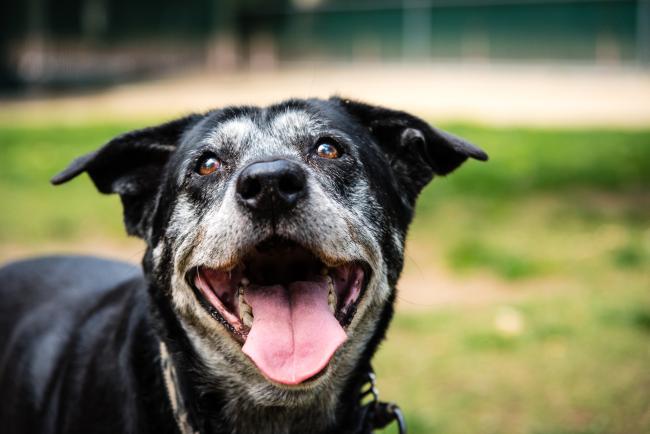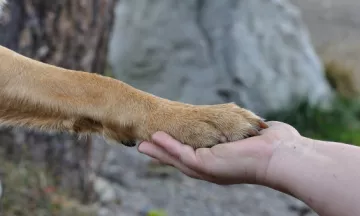It can be difficult to watch your dog grow older. But fortunately, we can do a lot to help our precious dogs age happily and healthily. Preventive care can keep many health issues at bay to ensure a comfortable and happy life.
When is a dog technically 'old'?
When a dog is considered old depends on factors such as the breed and genetics of each individual dog. In general, larger breeds age more rapidly (starting from age 6) than smaller breeds (starting from age 8 to 9). But some dogs show hardly any signs of age until much later in life.
You can recognise an ageing dog by its greying coat, which also becomes stiffer and duller. Your dog might slow down a bit and seem less playful and fit than before.
Senior food for dogs
If you notice that your dog is getting older, you might discuss with your vet a senior dog food diet. This specific diet has a different composition than regular dog food and ensures that your dog's joints, skin and coat remain in good condition. Senior nutrition often contains fewer calories so that your dog stays at a healthy weight, despite their reduced physical activity.
Some dogs lose their appetite as they age, so make sure that their food smells appealing to them. Many dogs enjoy canned food, but wet food can cause extra plaque and dental problems. If you want to make your dog's dry food extra tempting, sprinkle it with some salmon oil. Most dogs love it, and it's good for their fur.
Many older dogs get dental issues but don't like to show that they're in pain. Difficulty eating, extra drool and smelly breath may indicate dental and mouth problems: have a veterinarian check your dog's teeth regularly. Inflammation can be really painful for your dog and can also cause serious health problems elsewhere in the body.
Nails and fur care
As your older dog's body processes change and slow down, you might notice they have a fuzzier coat and a bit more gunk in their ears and eyes. Help your dog out by cleaning their nose, eyes and ears with a damp cotton cloth and brush their fur regularly to remove excess hair. If you notice your dog shaking their head more often than usual, this may indicate ear problems. In the case of excessive earwax or very weepy eyes, it's essential to take them to a veterinarian.
Exercise for older dogs
Many elderly dogs become a bit stiffer and suffer from some joint pain. You will notice that getting up becomes more difficult for your dog and that he or she slows down their walking pace. This is quite normal: your dog's muscle strength and physical condition do gradually decline with age. Adjust the intensity of your walks and play - and never force your dog to move too quickly, too wildly or for a very long period.
Do you notice intense stiffness, limping or pain? Then it's important to have the vet check for potential osteoarthritis or hip dysplasia. Dogs like to hide their pain from people, so it is our responsibility to look closely and detect issues at an early stage.

Dementia in dogs
Dementia can also occur in dogs from around 7 years of age. In addition, a dog may suffer from pseudodementia: this is not 'real' dementia, but the dog can show similar signs. Symptoms of pseudodementia can be: confusion, getting slower, peeing in the house, becoming more withdrawn, less appetite, depression.
It's important to ensure that an old, confused dog needs a lot of comforts, care, peace and quiet. Be patient and calm with your dog, especially as they may not understand everything as quickly as they did before. Furthermore, make sure your dog eats healthy, nutritious meals and maintains sufficient exercise to suit their physical ability and age.
Make sure the dog has a collar tag, is chipped and is registered, in case they get lost and can't find their way home.
Older dogs need comfort
Older dogs sleep more than young dogs. Therefore, make sure your dog has a warm, quiet place in the house where they will not be disturbed. A heat pack can provide extra comfort. And now is not the time to adopt a puppy or kitten into your home: your senior dog needs a well-deserved rest.

Troubleshooting
Old age comes with some discomfort, which is a fact of life that you shouldn't worry about too much. But it is important to detect and solve 'real problems'. Always consult a veterinarian if you see:
- Sudden weight gain or loss
- Peeing more/drinking more
- Gastrointestinal problems/diarrhoea
- Loss of appetite
- Bad breath
- Panting, drooling
- Scaly skin/scratching
- Dirty eyes or ears
- Changes in behaviour: more barking, restlessness, pacing etc.
A loving dog sitter
Just like younger dogs, older dogs are in great need of companionship, exercise and interaction with people. Make sure your senior dog is never left to feel lonely, even when you go on a holiday or are busy for work. At Pawshake you will always find a sweet dog sitter that can take care of your elderly dog in their own, comfortable environment.
Enjoy this special time together
Your walkies may be a little shorter, your ball games might be less exciting, and your dog may take a little longer to do old tricks. But it doesn't matter if life slows down for your pooch. Cuddling together on the couch and enjoying the little things make the life of the older dog rich, rewarding and worthwhile for you both!





